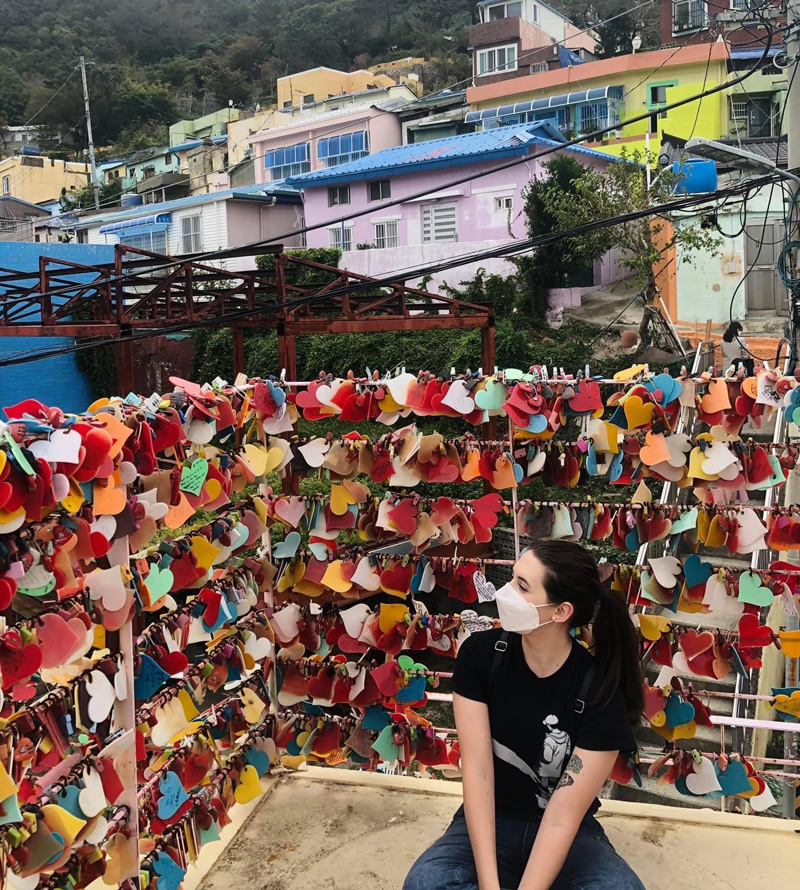A New Outlook on Patient Care After Battling COVID-19 Abroad
CentraCare – St. Cloud Hospital Social Worker Jennifer Anderson has a new outlook on health care after battling COVID-19 in another country during the height of the pandemic.
In August 2020, Jennifer decided to follow her intuition and teach English as a foreign language in Busan, South Korea. She traveled abroad during a time when acquiring a visa to travel was a difficult task.
Jennifer arrived in South Korea and immediately underwent a mandatory two-week quarantine.
“My first experience with their health care system was needing a few checkups and testing to get my alien card there. I will say it was very anxiety-provoking to navigate a hospital in a foreign setting where you don’t speak the language.”
Jennifer didn’t have access to translation services. She relied heavily on nonverbal communication to navigate the health care system.
Roughly six months after her arrival, she fell ill with COVID-19 when South Korea was taking each case very seriously.
“The government sent an ambulance to my place and told me to pack some items for a few weeks,” she remembered.
Without knowing how long she’d be hospitalized for, how much her health care costs would be, or understanding her care plan, Jennifer was living one of her worst nightmares.
“I was given paperwork to sign, and I didn’t know what it said. I ended up signing things I didn’t understand because I didn’t have the resources,” she confessed.
She shared a room with three other patients and communicated with her doctor over the phone in her room to limit his COVID-19 exposure. Jennifer received chest X-rays, IVs and other medical procedures with only non-verbal communication.
She became extremely fearful about what her medical expenses would be after her doctor, who spoke broken English, told her, “Very high.”
“I didn’t decline anything at first,” Jennifer acknowledged. “I kept asking how much money it would be but they either didn’t understand or they didn’t know. I started refusing medical treatments,” she stressed.
 When Jennifer was finally told she’d be leaving the hospital two days after being admitted, they asked for payment in full. To her relief, the total bill was about $300 in U.S. currency.
When Jennifer was finally told she’d be leaving the hospital two days after being admitted, they asked for payment in full. To her relief, the total bill was about $300 in U.S. currency.
Even though she was cleared to leave the hospital, her journey was far from over.
“I didn’t know where I was going next. They brought me out to another ambulance that took me to a government facility for further quarantine.”
Jennifer recalls hearing announcements over the intercom when meals were delivered outside her bedroom door.
“I couldn’t understand the message, but I knew when the announcements were over, food was outside my door.”
When she was finally cleared to leave quarantine, she sought help with arranging transportation to get her back to where she was staying.
“They said they couldn’t help me. I was outside in a strange place I didn’t know and used Google Maps to walk about two miles to the nearest subway station.”
Jennifer decided it was time for her to go back home to the United States.
“There were many barriers to going home. I needed proof from a doctor that I finished my quarantine and was medically cleared to travel. The facility I quarantined from refused to give me a note.”
Jennifer found herself going back to the hospital using translation services on her phone to try to communicate with the medical staff.
“I walked around to multiple counters … I was desperate at this point. They got me to a pulmonologist, and I was a bit frantic. I started showing him all my pre-translated pictures.”
That’s when Jennifer realized her pulmonologist spoke fluent English.
“He said, ‘Calm down, it’s OK. I will help you,’” recalled Jennifer. “I nearly broke down crying. I was so grateful.”
 Thankfully, Jennifer was able to travel home safely. She says the experience taught her a lot about caring for patients in her own role as a CentraCare social worker.
Thankfully, Jennifer was able to travel home safely. She says the experience taught her a lot about caring for patients in her own role as a CentraCare social worker.
“I have a newfound level of empathy for patients from different cultures and backgrounds or who speak different languages,” Jennifer admitted. “It reminded me that we never really know what’s going on in a patient’s life. What was just another workday for those nurses was one of the most difficult times of my life due to various dilemmas on top of being hospitalized.”
Jennifer says she now understands the level of stress and anxiety the health care system may be causing patients who are unfamiliar with our organization.
“I am more than happy to use interpreters whenever it could benefit a patient.”
